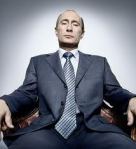 The question assumes the two categories are ‘either-or’. A better question: are Vlidimir Putin’s behaviours explained better by transformational or charismatic leadership maps?
The question assumes the two categories are ‘either-or’. A better question: are Vlidimir Putin’s behaviours explained better by transformational or charismatic leadership maps?
Beware the ‘Either-or’ question
A quick visit to textbooks of leadership (such as Dilemmas of Leadership) provides ways of answering the questions and explains the difficulties inherent in an ‘either-or’ formulation. One reason is that an either-or perspective overlooks overlooks the key point that in empirical studies, leaders display a full range of styles including transformational and transactional features.
The charismatic leadership map
Charismatic leaders have been mapped from ancient times. The core assumption about them is that they have special skills or gifts so that followers are captivated by them and their ideas.
The transformational leadership map
The transformational map is a modern treatment of leaders (ca 1980s) which acknowledges some features are charismatic. The Transformation leader, as its label implies, transforms the worlds of their followers (which can be local to a team or organization, or global to the leader of a Nation State).
Transformational leaders are assessed most commonly on a scale developed by Bass and Avolio which captures a ‘full range’ of factors including transformational and transactional ones. Transformational leaders mostly require some transactional skills as well.
Other differences
The older maps of charismatic leadership have increasingly been extended to incorporate the ‘dark side’ of charismatic leadership manifest in tyrannical leaders. Transformational leadership has tended to treat tyrannical leaders as a special case. This has produced the so-called ‘Hitler dilemma’ for transformational research.
In part, the difficulty may be seen to require attention to the ‘dark side’ of leaders which is not generally considered.
Putin as a Grand Prix driver
A recent news article from Xinhuanet shows Mr Putin as a Grand Prix driver.
Jeff Schubert’s view
LWD subscriber Jeff Schubert notes
In order to justify his impending return to the presidency, Putin has invoked the cases of Franklin D. Roosevelt, Charles De Gaulle and Helmut Kohl as men who held power for a long time and who have been treated quite well be history – in contrast to Russia’s own Leonid Brezhnev.
Dmitry Peskov, his press secretary has said: “Putin reads all the time, mostly about the history of Russia. He reads memoirs, the memoirs of Russian historical state figures…”
The maps suggest…
If the distinction between transformational and charismatic style holds, a case could be made that Putin fits the older maps of someone who is actively promoted as a charismatic leader more than as the more modern transformational one.
Recent events
Recent events in The Ukraine have brought President Putin into the international spotlight. The western media have tended to mock the assiduous building of his image of the great leader, although with less contempt than in their treatments of North Korea’s incumbent. His decisive military intervention in the Ukrainian crisis has drawn attention to his power to influence world events.
Worth thinking about
Emerging events suggest that Putin is being seen as a modern illustration of The Great Man theory of leadership.. The theory was associated with Thomas Carlyle in the nineteenth century and considers that heroic and rare individuals shape the course of history. The contrary theories suggest that historical situations create powerful leaders. Cometh the hour, cometh the leader…
In many cultures the yearning for a Great Man to emerge and lead the people to greatness or rescue them from danger remains. Students are left to consider why the theory tends to ignore the Great Woman theory of leadership.
Interest in this post increased at the height of the Ukraine crisis [March 2014]. Is someone adding the Lone Ranger style to those attributed to Putin?



 Posted by Tudor Rickards
Posted by Tudor Rickards 
 Click for regular updates
Click for regular updates